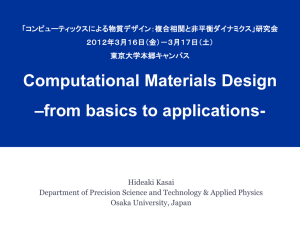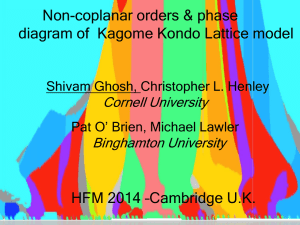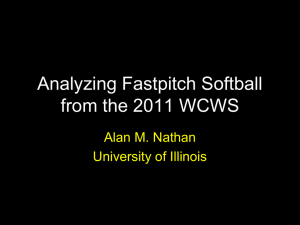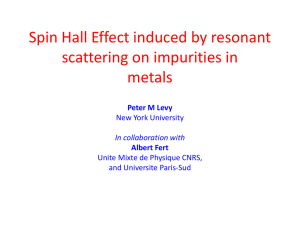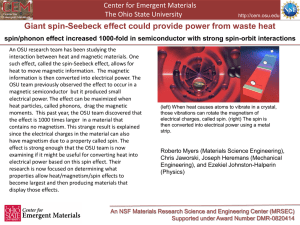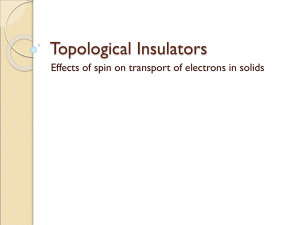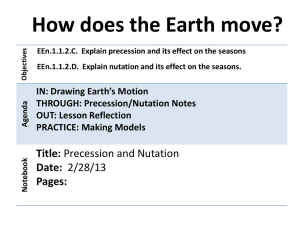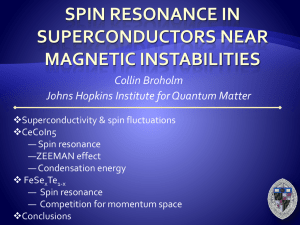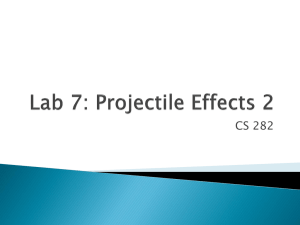Presentation (PowerPoint)
advertisement
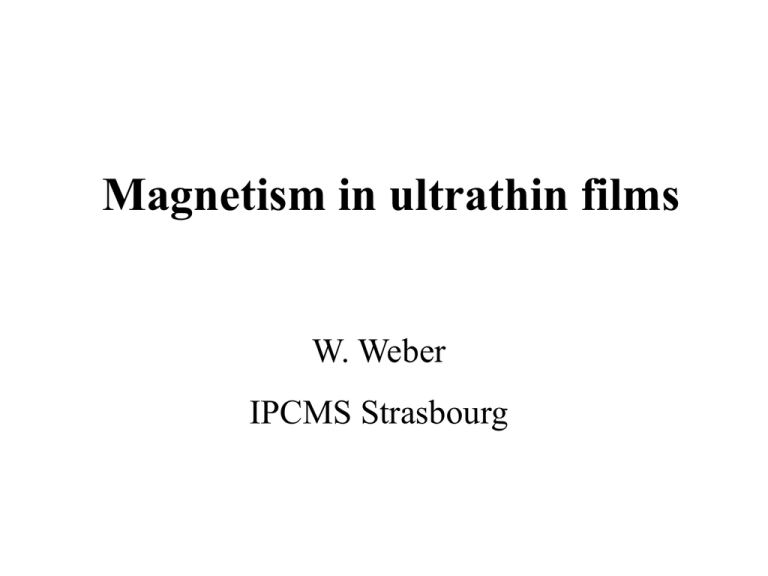
Magnetism in ultrathin films W. Weber IPCMS Strasbourg Orbital and Spin moment Intuitive : Orbital moment Mysterious : Spin moment q 2 2 m orb I F q ( r ) ( mr ) 2 2m q L 2m m orb g l B l q l 2m q l 2m with gl 1 Angular spin momentum m spin g s B s with : s gs 2 Ferromagnetism Paramagnetic behavior: usually one has to apply an external magnetic field in order to align the magnetic moments H H T Ferromagnetic behavior: magnetization without an external magnetic field at non-zero temperatures possible Ferromagnetism How can we explain magnetic order up to temperatures of 1000 K? Curie temperature Ferromagnetism Early explanation (1907): Weiss’ molecular field A molecular field exists within the ferromagnet which orders the moments against the thermal motion. It is so large that the ferromagnet can be saturated even without an external magnetic field. Order of magnitude: k B Tc 0 B H m Tc 1000 K H m 10 A/m 9 Ferromagnetism What is the physical interaction responsible for it? Dipole-dipole interaction? E dip Strength 1 r 3 m1 m 2 r 0 B a 3 3 5 m r m r 1 2 2 1K Too weak! Ferromagnetism Interplay of Pauli principle and Coulomb interaction Two electrons of opposite spin can share the same orbital and come close Two electrons of same spin cannot farther apart Lower Coulomb energy This interaction does not act like a real magnetic field Exchange interaction in a solid H J Si S j i j J positive : parallel orientation (ferromagnetic) J negative : anti-parallel orientation (anti-ferromagnetic) The strength of the interaction depends on the orbital overlap between neighbouring atoms decreases exponentially with distance Indirect exchange coupling in multilayers FM2 nonmagnetic metal FM1 Indirect exchange coupling Unguris et al., Phys.Rev. B 49, 14 (1994) Indirect exchange coupling in multilayers Amplitude of the coupling strength decreases with thickness Co80Ni20 / Ru / Co80Ni20 Co80Ni20 / Ru / Co80Ni20 Parkin et al., Phys.Rev. B 44, 7131 (1991) Indirect exchange coupling RKKY interaction (Ruderman, Kittel,Kasuya, Yosida). It explains for instance the coupling in rare earth systems Virtually no overlap between magnetic 4f-orbitals Indirect exchange through conduction electrons RKKY interaction Spin density distance RKKY interaction Spin density distance RKKY interaction Spin density distance RKKY interaction Spin density distance RKKY interaction Spin density distance RKKY interaction RKKY interaction RKKY interaction RKKY interaction J 1 R 2 sin( 2 k F R ) Giant magnetoresistance Fe Magnetic Cr Non magnetic Fe Magnetic Baibich et al., PRL 61,2472 (1988) Spinfilter effect Paramagnet E EF D ( E ) D ( E ) Spinfilter effect Ferromagnet E weak scattering strong scattering EF D ( E ) D ( E ) Giant magnetoresistance r R R r R tot Rr 2 R 2 Giant magnetoresistance r R r R R tot 2 Rr Rr 2r GMR read head voltage voltage voltage voltage voltage voltage voltage voltage Spin-resolved photoemission spectroscopy on MnPc/Co(001): spin-polarized interface states Insulating spacer layer : tunneling MR TMR P N maj N min 2P 1 P2 1 P1 P2 Pi = polarisation N maj N min = DOS DOS - DOS DOS Jullière’s model Co / STO / LSMO TMR 2P Co P LSMO 1 PCo P LSMO Co / ALO / STO / LSMO The polarisation depends on the interface !! De Teresa et al., Science 286 (1999) Mn(II)-phthalocyanine : Mn-C32H16N8 Advantage: large spin diffusion length expected due to weak spin-orbit coupling in low-Z materials. MnPc Co(001) Cu(001) Photoemission spectroscopy Spin detector n Au foil N L 1 f Pn A N R 1 f Pn NL NR NL NR f Pn Spin-resolved spectra E EF D ( E ) D ( E ) Spin-resolved spectra Spin-resolved spectra Spin-resolved spectra Spin-resolved spectra Interface state Difference spectra Difference spectra Difference spectra Difference spectra contribution of the different Pc layers to the interface states first layer second layer third layer Polarization of difference spectra Character of interface states Determination of the character by exploiting the variation of the cross section with photon energy. By going from 20 to 100 eV the cross sections change by the following factors: Co 3d: 1.4 Mn 3d: 0.7 C 2p: 1/40 N 2p: 1/20 Character of interface states 200 Intensity (arb. units) 2,6 ML Pc/Co(3 ML) - Co(3 ML) 100 spin up spin down 0 0,0 0,5 1,0 h=100 eV 1,5 Binding energy (eV) 2,0 Co EF Interface Pc/Co EF C. Barraud et al., Nature Phys. (2010) Co EF Interface Pc/Co EF C. Barraud et al., Nature Phys. (2010) Co EF Interface Pc/Co EF Electron spin motion: a new tool to study ferromagnetic films 1 0 0 0 1 Spin up 1 0 M 0 1 ? r e i 1 i r e 0 0 1 Spin down z M P0 x y z M y x z M y x z M y x z M y ε x 1 0 0 0 1 Spin up 1 0 M 0 1 ? r e i 1 i r e 0 Spin down 0 1 r 2 r arctan 2r r 2 z M y ε x z M y ε x z M y ε x z M y ε x z M y ε x Experiment Spin-dependent band gaps and their influence on the electron-spin motion Typical electronic band structure Experimental results Theory Joly et al., PRL 96, 137206 (2006) Spin-dependent band gaps and their influence on the electron-spin motion Fabry-Pérot experiments with spin-polarized electrons Quantum interference P0 Co Cu (001) Quantum interference P0 Cu Co Cu (001) Quantum interference P0 Cu Co Cu (001) Quantum interference P0 Cu Co Cu (001) Quantum interference P0 Cu Co Cu (001) Experimental results and simulations Joly et al., PRL 97, 187404 (2006), Joly et al., PRB 76, 104415 (2007) Joly et al., PRL 97, 187404 (2006), Joly et al., PRB 76, 104415 (2007) Spin-dependent band gaps and their influence on the electron-spin motion Fabry-Pérot experiments with spin-polarized electrons Morphology-induced oscillations of the electronspin precession Fe/Ag(001) Tati Bismaths et al., PRB 77, 220405(R) (2008) A/B without relaxation at the islands edges A/B with relaxation at the islands edges coverage parameter coverage coverage parameter parameter parameter coverage coverage coverage parameter parameter parameter parameter coverage coverage coverage coverage parameter parameter Spin-dependent band gaps and their influence on the electron-spin motion Fabry-Pérot experiments with spin-polarized electrons Morphology-induced oscillations of the electronspin precession Influence of sub-monolayer MgO coverages on the spin-dependent reflection properties of Fe d (ML) T. Berdot et al., PRB 82, 172407 (2010) MgO-induced perpendicular relaxation of the Fe surface H.L. Meyerheim et al., Phys. Rev. B 65, 144433 (2002) MgO-induced normal relaxation of the Fe surface H.L. Meyerheim et al., Phys. Rev. B 65, 144433 (2002) MgO-induced normal relaxation of the Fe surface Relaxation(%) 20 15 10 5 0 0,0 H.L. Meyerheim et al., Phys. Rev. B 65, 144433 (2002) 0,5 1,0 1,5 2,0 2,5 MgO thickness (ML) 3,0 Ab initio calculations Ab initio calculations based on linear muffin-tin orbital method (LMTO) and the Korringa-Kohn-Rostoker (KKR) method. - 9 ML Fe - First interlayer distance is relaxed without actually putting MgO on top of Fe d=? d=dFe bulk=1,43 Å Fe(001) Relaxation(%) 30 (deg.) Theo Theo 20 20 15 10 40 35 30 5 25 0 0,0 10 0,5 1,0 1,5 2,0 2,5 MgO thickness (ML) 3,0 20 (deg.) 40 15 0 10 Exp Exp 60 50 20 15 30 20 10 10 5 0 0 -10 -5 -20 0,0 0,2 0,4 0,6 0,8 MgO thickness (ML) T. Berdot et al., PRB 82, 172407 (2010) 1,0 (deg.) (deg.) 40 25 Spin-dependent band gaps and their influence on the electron-spin motion Fabry-Pérot experiments with spin-polarized electrons Influence of lattice relaxation on the spin precession in Fe/Ag(001) Morphology-induced oscillations of the electronspin precession Influence of sub-monolayer MgO coverages on the spin-dependent reflection properties of Fe precession angle (degrees) A. Hallal et al., PRL 107, 087203 (2011) precession angle (degrees) A. Hallal et al., PRL 107, 087203 (2011) precession angle (degrees) A. Hallal et al., PRL 107, 087203 (2011) precession angle (degrees) A. Hallal et al., PRL 107, 087203 (2011) precession angle (degrees) A. Hallal et al., PRL 107, 087203 (2011) precession angle (degrees) A. Hallal et al., PRL 107, 087203 (2011) precession angle (degrees) A. Hallal et al., PRL 107, 087203 (2011) MgO/Fe(001) dislocations pseudomorphic growth Ramsauer-Townsend effect Resonance condition weak scattering on-resonance scattering phase is zero off-resonance scattering phase is non-zero DEex Energy A. Hallal et al., PRL 107, 087203 (2011) Spin-dependent band gaps and their influence on the electron-spin motion Organic molecules on ferromagnetic surfaces Influence of lattice relaxation on the spin precession in Fe/Ag(001) Fabry-Pérot experiments with spin-polarized electrons Morphology-induced oscillations of the electronspin precession Influence of sub-monolayer MgO coverages on the spin-dependent reflection properties of Fe precession or rotation angle (degrees) of H Pc 2 25 of C o (vert. shifted by 2 ) 60 of Pentacontane (vert. shifted by 4 ) of carbon (vert. shifted by 12 ) o 20 o 15 10 5 0 0,0 0,2 0,4 0,6 thickness (ML) 0,8 1,0 Coils Sample GaAs Electron optics Spin detector Coils Deflector Electron optics Retarding field analyser Pockels cell Polarizer Laser GaAs : Source of polarized electrons P N N N N 50 %
